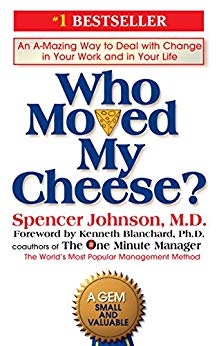

This article is an excerpt from the Shortform summary of "Who Moved My Cheese" by Spencer Johnson. Shortform has the world's best summaries of books you should be reading.
Like this article? Sign up for a free trial here .
Who Moved My Cheese, a bestseller by Spencer Johnson published in 1998, is a parable about the inevitability of change, the ways in which we typically deal with it, and how revising our attitude toward change can reduce stress and increase success. Like all parables, it’s told as a story that you can relate clearly to your life, and it can help you learn strategies for coping with life changes and transitions.
We’ll cover the basic premise of the Who Moved My Cheese parable and discuss how its lessons might apply to your life. Learn the secrets to coping with life changes and transitions.
The Narrative
Before discussing how Who Moved My Cheese can advise you in coping with life changes and transitions, let’s review the parable:
The story takes place in a maze, where four characters search for and consume cheese. Cheese represents happiness or satisfaction in its various forms — for instance, security, prestige, or wealth.
Two characters, Sniff and Scurry, are mice who take an industrious, uncomplicated trial-and-error approach to finding cheese, They don’t overthink things, instead trying out various routes until one day they find a large store of cheese.
The other two characters, Hem and Haw, are little humans who apply more sophisticated thinking and analytical skills to the daily search. They, too, find the same large stockpile of cheese as the mice.
But the two have very different attitudes toward their situation. The humans Hem and Haw take the cheese for granted, assuming it will always be there. By contrast, the mice stay alert to their surroundings. They notice that the quality and supply of the cheese are slowly dwindling. We’ll see this is key to coping with life changes and transitions.
One day the cheese is gone. How the characters cope with this change offers lessons in surviving and thriving despite the inevitable changes in life and the workplace.
The simple-minded mice don’t overthink things. They quickly accept the changed situation for what it is, not cursing the world or the environment for its unfairness. They adapt to the change and immediately head out to look for new cheese. And while it takes concerted effort, they eventually find happiness in the form of a huge new pile of cheese.
In contrast, the humans Hem and Haw are shocked to lose the cheese. They had felt entitled to it, and they curse the world for its unfairness. They sit around, waiting for the cheese to reappear, and they become increasingly frustrated when it doesn’t. Hem yells, “Who moved my cheese?”
Eventually, hunger gnawing at him, Haw realizes his situation isn’t going to improve unless he changes his attitude and behavior. This is a pivotal moment in coping with life changes and transitions. Going back out to the maze to find new cheese is scary, and it’ll take hard work. But he envisions the joy of finding cheese again, and it pushes him outward. He leaves behind Hem, who refuses to move and continues fuming at the unfairness of his situation.
In his journey, Haw overcomes his psychological barriers to adapting to change. He realizes that his fear of going back out to find new cheese was overblown — he had let the fear build up in his mind, and in reality it wasn’t that bad. He encounters setbacks in the maze, but he realizes he’s still happier taking control rather than being a victim of his situation. He continues imagining enjoying new cheese, which motivates him to push further. As he learns each of these lessons, he writes messages on the wall for Hem to read, should he ever decide to search for new cheese himself.
Finally, he finds a new giant pile of cheese, even bigger than the first. Sniff and Scurry have already been there for some time, happily enjoying the cheese. Haw reflects on how far he has come since the first cheese pile ran out, and he resolves to treat future change differently. Next time, he will be better at coping with life changes and transitions.
Coping with Life Changes and Transitions
It’s easy to draw parallels from the story to unsettling changes in our own lives — for instance, changes in a job, relationship, or health. The characters’ flaws and successes reflect our own tendencies when coping with life changes and transitions: Like Haw, we may resist, complain, and deny change because we’ve become complacent or afraid. Or we can be like Sniff and Scurry, staying on our toes, preparing for future change, not overanalyzing things, and being ready to adapt without fear.
Even when we adapt, change is initially challenging, and Who Moved My Cheese offers a road map for navigating change in a way that minimizes stress.
The key takeaways for coping with life changes and transitions are:
- Realize that change is inevitable. Anticipate it and look for signs that it’s coming.
- When change happens, overcome your fears, most of which are exaggerated, and move quickly to adapt. If you don’t, you may be left behind as others gain the benefits and advantages of adapting.
- You can enjoy change: Learning and experiencing new things is rewarding. Taking control of your situation is empowering.
- Expect and prepare for further, ongoing change.
There’s at least one period in a person’s life, usually many, that involves coping with life changes and transitions. Remember this parable to help you cope successfully.
———End of Preview———

Like what you just read? Read the rest of the world's best summary of "Who Moved My Cheese" at Shortform . Learn the book's critical concepts in 20 minutes or less .
Here's what you'll find in our full Who Moved My Cheese summary :
- The absolute worst thing to do when change is coming
- How to adapt to change, like the key characters
- How to handle change in work and life






